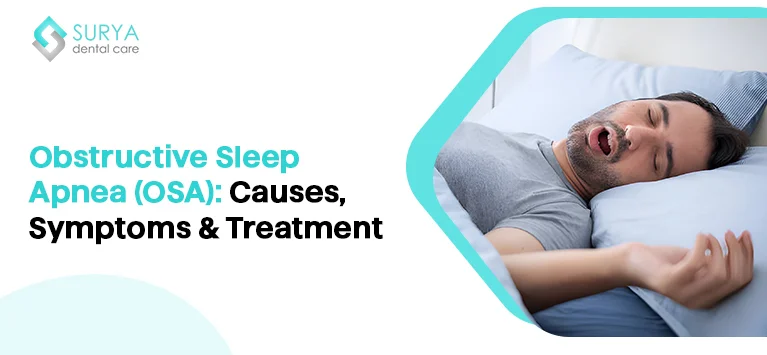Estimated obstructive Sleep apnea affects 936 million adults around the world and can lead to serious complications to our heart, kidneys and metabolic when it is left untreated. Interestingly, dental health plays a significant role in diagnosing and managing sleep apnea. Dentists are the ones who often spot early signs such as worn tooth surfaces and enlarged tongues, making regular dental check-ups crucial for early detection and intervention of this potentially life-threatening condition. This post explains all the symptoms, causes, and treatments of obstructive sleep apnea.
What is Meant by Sleep Apnea?
Sleep apnea is one of the sleep disorders characterized by repeated pauses in breathing during sleep. These pauses are called apneas, can last from a few seconds to a few minutes and may occur 30 times or more per hour. Sleep apnea is a serious condition that can have significant health consequences if left untreated.
The link between Sleep Apnea and Dental Health
- Dental health and sleep apnea are closely related. Various dental problems might result from sleep apnea.
- Mouth breathing, which is frequent in those with sleep apnea, dries out the mouth, decreases saliva, and raises the risk of gum disease and tooth decay.
- Dry mouth might result from using Continuous Positive Airway Pressure (CPAP) equipment.
- Tooth wear and jaw pain can be caused by bruxism or teeth grinding, which is frequently linked to sleep apnea.
- Dentists can assist in diagnosing sleep apnea by looking for symptoms such as swollen tongue and worn tooth surfaces. They can also suggest oral gadgets to help maintain airway patency while you sleep because the dentist could be the one who can identify the sleep apnea symptoms during the visit to dentists.
Three main types of sleep apnea
- Obstructive sleep apnea (OSA): This is the most common type of sleep apnea, occurring when the airway becomes blocked or obstructed during sleep, usually by the relaxation of the tongue and throat muscles.
- Central sleep apnea (CSA): This type of sleep apnea occurs when the brain fails to signal the muscles to breathe, often due to a medical condition affecting the central nervous system.
- Complex sleep apnea syndrome (CompSAS): CompSAS is a combination of both obstructive Sleep apnea and central sleep apnea.
Causes of Obstructive Sleep Apnea
There are several potential causes and risk factors for obstructive sleep apnea, including
- Obesity: Excess weight, especially around the neck and upper body, is a major risk factor for OSA. The extra weight can put pressure on the airway, making it more likely to collapse during sleep.
- Anatomy of the upper airway: Certain anatomical features, such as a large tongue, small jaw, or large tonsils and adenoids, can contribute to airway obstruction.
- Aging: As we get older, the muscles in the throat tend to relax more during sleep, increasing the risk of OSA.
- Genetics: Research suggests that there may be a genetic component to OSA, with certain individuals being more predisposed to the condition.
- Alcohol and sedative use: Consuming alcohol or taking sedatives before bedtime can relax the throat muscles and worsen OSA.
- Nasal congestion: Conditions that cause nasal congestion, such as allergies or a deviated septum, can also contribute to OSA by making it harder to breathe through the nose.
- Medical conditions: Certain medical conditions, such as hypothyroidism, acromegaly, and Marfan syndrome, can increase the risk of developing OSA.
Obstructive Sleep Apnea (OSA) Symptoms
The following are the main signs of obstructive sleep apnea:
- Loud & frequent snoring: Snoring is often the first and most noticeable symptom of OSA.
- Pauses in breathing during sleep: Family members or bed partners may notice periods where the person stops breathing for a few seconds or longer.
- Excessive daytime sleepiness: People with OSA often feel excessively tired during the day, even after a full night’s sleep.
- Difficulty concentrating: The fragmented sleep caused by OSA can make it hard to focus and concentrate during the day.
- Morning headaches: Many people with OSA experience persistent headaches upon waking.
- Irritability and mood changes: The lack of quality sleep can lead to mood swings, irritability, and depression.
- Decreased libido: OSA can also contribute to a decrease in sexual desire and function.
If you experience any of these symptoms, it’s important to speak with a healthcare provider, as they may indicate the presence of obstructive sleep apnea.
Treatment Options For OSA
Obstructive sleep apnea is a chronic condition that requires ongoing management. The primary goals of OSA treatment are to improve breathing during sleep, reduce the number of apnea events, and alleviate associated symptoms. The most popular therapies for OSA consist of
- Continuous Positive Airway Pressure (CPAP) Therapy: CPAP is considered the gold standard treatment for moderate to severe OSA. It involves using a machine that delivers a steady flow of air through a mask worn during sleep, keeping the airway open and preventing apnea events.
- Oral Appliance Therapy: For mild to moderate OSA, an oral appliance, such as a mandibular advancement device, can be used. These devices work by positioning the lower jaw slightly forward, which helps keep the airway open during sleep.
- Surgery: In some cases, surgery may be recommended to treat OSA. Surgical options include removing or reshaping excess tissue in the throat, widening the nasal airway, or repositioning the jaw. Always before surgery, other options will be tried, and only at last will doctors recommend surgery
- Lifestyle Changes: Making lifestyle changes can also help manage OSA. This may include weight loss, avoiding alcohol and sedatives before bedtime, and maintaining a regular sleep schedule.
Takeaway
Obstructive sleep apnea ranges from mild to severe based on the episodes that happen in an hour. More than 90% of individuals identify constructive sleep apnea as the snoring symptom. Untreated OSA could cause severe health complications, so consult with healthcare providers when you identify any of the symptoms. Getting treated in the mild stage of OSA can avoid serious health complications.







